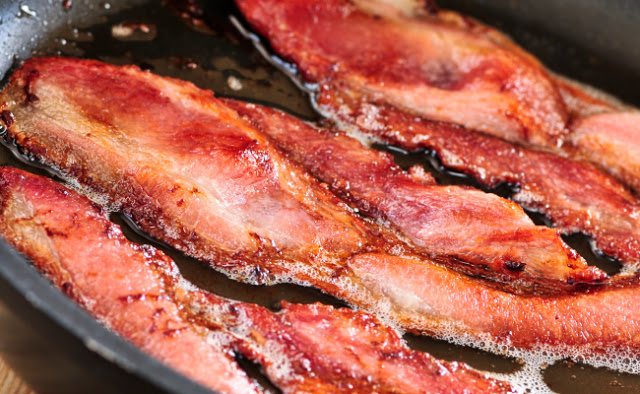| Online: | |
| Visits: | |
| Stories: |
This is How Bacon Causes Cancer
by Katie Medlock
Care2
Last month’s report by the World Health Organization on the cancerous risks of consuming processed meats left everyone in a buzz for a week or so, yet it may be a while until we can see if consumers are eating less of the stuff because of it. The temporary nature of media coverage, however, does not mean the risks are less real for folks who munch on meat without worrying about the headlines; the risks of processed meat should be concerning for all shoppers.
But, how exactly does processed meat cause cancer? Time recently published an infographic explaining some of the contributing factors to America’s current favorite fad: bacon. Using the expertise of Mariana Stern, cancer epidemiologist and professor at the University of Southern California and data from the WHO and the Global Burden of Disease Project, the science spells out just how nasty carcinogens are cultivated in the processing of meat.
Why bacon? “Bacon culture” has to be the most perplexing trend of recent times. Not only does consuming it contribute to well-known health risks, it is also a product of unimaginable suffering. Any time I hear the ubiquitous “Everything’s better with bacon!” comment, my heart cringes. As a vegan, for ethical reasons, it’s baffling to hear how a product borne of pain, torture and terrifying death could become such a whimsical, celebratory food product. If the moral reasoning behind eschewing meat-based bacon isn’t enough to opt out, let’s dive into the health reasoning—specifically cancer-causing risks:
1. Nitrates and Nitrites
Many processed meats are preserved with nitrites or nitrates (which turn into nitrites in the body). These can form carcinogenic compounds called nitrosamines, which can damage DNA. Cooking with high temperatures also increases the occurrence of nitrosamines. This compound has been found to cause cancer in a variety of animal species and evidence has been found linking nitrosamines to gastric cancer and esophageal cancer in humans. “Nitrate-free” products are still treated with nitrate salt from celery juice and our bodies cannot tell the difference.
2. High Temperatures
Frying, roasting or grilling meats at high temperatures leads to carcinogen formation. One nasty compound, heterocyclic amine, is linked with cancers of the colon, rectum, breast, prostate, pancreas, lung, stomach and esophagus. Polycyclic aromatic hydrocarbons are also linked to a bevy of health risks. Unfortunately for bacon-lovers, pan-frying uses exceptionally high heat, increasing the risk further.
3. Heme Iron
This iron-transporting molecule found in meat can play a part in the formation of N-nitroso compounds, found to be linked significantly with cancer risk, especially colorectal cancer. Heme iron toxicity can be a catalyst for cancer formation.
Fear not, if you are understandably concerned about the risks of conventional bacon (turkey bacon, included, by the way)—there are tons of plant-based bacons on the market. Or, you could make your own replications of the smokey and salty cultural favorite with ingredients possibly already sitting in your pantry. From coconut bacon, tempeh bacon, seitan bacon, shiitake bacon, tofu bacon, zucchini bacon and eggplant bacon, nowadays there is no excuse to keep eating pork products, or any processed meats.
Every Day is Earth Day
Source: http://www.riseearth.com/2015/12/this-is-how-bacon-causes-cancer.html







Muslims dont like bacon, but they smoke cigarettes and they hate us Western people. Mainstream Media will probably try banning all pork products too to make you some kind of “victim” with guilt or something. I spit on psychology, but they can poop too.
__________________
Eat More GMO
Fearmongering Radical Vegan.
To make it cancerous, you need to eat more than 3 slices of bacon daily for the rest of your life to raise the chance of getting cancer by 20 percent. In the case of bowl cancer that is raiser from 5 people in a 100.000 to 6 people in a 100.000
So would the author eat bacon when there is a free range pig farm where they kill ethically?
Be an American Eat Bacon
Being busy with nonsense like this takes more out of your life then eating bacon.